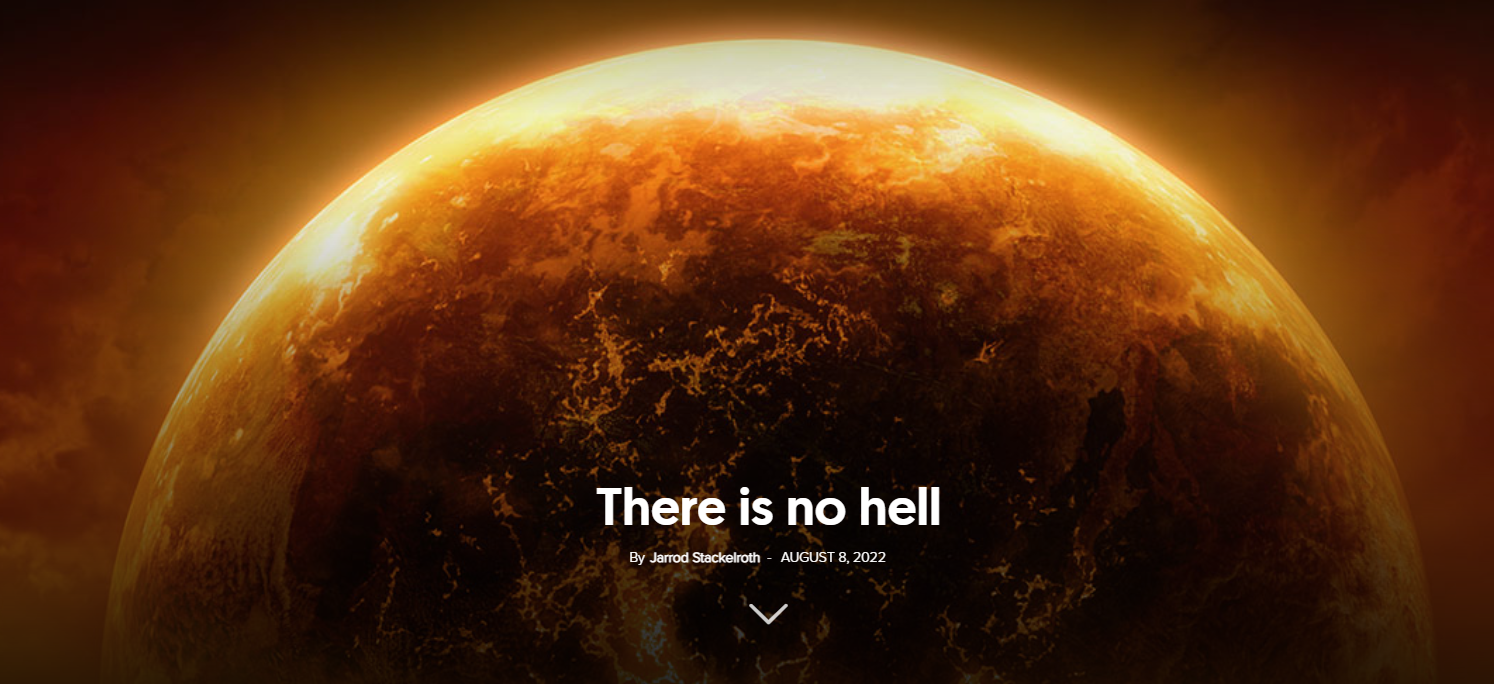What do you imagine heaven will be like? American science-fiction writer Isaac Asimov famously said, “For whatever the tortures of hell, I think the boredom of heaven would be even worse.” Although I love Jesus, I think I am a bit afraid of getting bored there too. There’s a prevailing picture of heaven as being some sort of suspended animation, which may play into this.
Thankfully, the Bible dispels some of these misconceptions in Revelation 21 which describes in plain detail what God’s new heaven and new earth will be like. I invite you to discover with me three secrets that will change your mind about heaven.
1. Earth is our home
The planet Earth, not heaven, will be our eternal home. In the biblical book of Revelation the prophet John was given a vision of what the end of the world would look like—as well as what comes after. According to John’s tour of this time period, we will spend 1000 years in heaven, and at the end of that time the earth will be purified and re-created. Heaven’s capital city—the New Jerusalem—will descend from heaven, and God’s dwelling place will be with us on the new earth (Revelation 21:1-3).
This truth has massive ecological and theological implications! Because our fragile blue planet will be our eternal home, learning to take care of it is critically important (Revelation 11:18). Our planet is not disposable. In fact, God brings his holy city down to be with us on Earth instead of the other way around. It will be our forever home! And the fact that God’s presence will be with us on the new earth, too, shows how astonishing God’s love for us is.
Best-selling author Randy Alcorn comments, “Instead of us going up to God’s place to live forever, God will come down to live with us in our place, literally bringing heaven to Earth!”[1]
When we think about spending eternity with God, we shouldn’t picture some ethereal existence, floating around on puffy clouds. We will live right here, on the new earth.
2. The best job on Earth
Describing life on the new earth as he saw it in his short tour, the apostle John wrote, “No longer will there be any curse…And his servants will serve him” (Revelation 22:3, italics added). In other words, life on the new earth will be curse-free (no illnesses, no social injustices, no death) and purposeful. We will have jobs, and we will serve! These won’t be soul-crushing jobs. Life won’t be just about paying bills and feeding and clothing ourselves, but a higher, more satisfying purpose.
Seventh-day Adventist author Ellen White commented, “The grandest enterprises will be carried forward, the loftiest aspirations will be reached, the highest ambitions realised. And still there will arise new heights to surmount, new wonders to admire, new truths to comprehend.”
I envision the new earth buzzing with innovation: art, science, sports and much more that John’s guided tour could not even begin to describe. Our creativity will have no boundaries!
Part of our job on this new earth will be to rule with God. When God created our planet, He made Adam and Eve in His image. He also made them rulers over the planet and blessed them with these words, “Be fruitful and multiply. Fill the earth and govern it. Reign over the fish in the sea, the birds in the sky, and all the animals that scurry along the ground” (Genesis 1:28, NLT). After the world is made new, our role as rulers and ambassadors of this planet will be fully restored.
And there’s more! Revelation 3:21 tells us that those who accept the Lord Jesus Christ as their Saviour will receive the incredible privilege of sitting with Him on His throne! In the ancient world, Eastern thrones were wider than just one seat, allowing more than one person to sit on them. When a king wanted to honour and bestow power on a servant, he would invite him to sit with him on his throne. God wants to give us this level of honour and responsibility. We will be able to experience God’s glory directly.
Can you imagine it? The second coming of Jesus doesn’t mean the end of your career and professional aspirations but the ultimate shattering of the glass ceiling. The Lord will expand our authority as rulers (Luke 19:17) and give us jobs like no other.
3. Redeemed memories
Some people think that God will wipe out our memories when we get to heaven. At a glance, the idea of our resurrected body being brand new may make you think this. However, a “factory reset” would make us unable to recognise anyone, including ourselves! Without our memories, we would also lose crucial aspects of our personalities, including the reasons why we love and trust God.
The Bible doesn’t talk about celestial amnesia. Instead, it says we will sing the song of Moses (Revelation 15:3), which is a song of redemption. It also speaks of a song that nobody can learn except those who have been saved (Revelation 14:3). Dr. Robert G. Lee stated: “Our best music here on earth will sound like a bumblebee in a bottle compared to the music there.” Of course, to sing these songs, and to mean every word we say, we’ll need memories, so the idea that our new bodies will not have our memories seems like pure speculation.
But what about traumatic memories? They will be healed in a therapeutic process led by God Himself. The Bible says that “He will wipe every tear from [our] eyes, and there will be no more death or sorrow or crying or pain. All these things are gone forever” (Revelation 21:4, NLT, italics added). Often, we face tearful news on earth, being forced to see good people suffer and evil prosper, but in heaven we will never have to worry about this.
I often skip the first part of this verse, but it clearly says that it is only after God wipes away our tears that there will be no more crying or pain. There will be a healing process! When the Bible says that we won’t think about the old things (Isaiah 65:17), it means we will be completely healed from trauma. Emotional triggers will be deactivated. Former traumatic memories will no longer invade our hearts or cause us any pain or shame.
What about sex in heaven?
I recently asked this question of a friend who is a respected Bible expert. He pointed out something very interesting: the widespread view that there will be no sex in heaven is mostly based on an answer Jesus gave to a Jewish group known as the Sadducees. Interestingly, their question was not about sex but about the doctrine of the resurrection. Jesus was being cross-examined by the religious leaders of His time, who were trying to curtail His power.
The Sadducees did not believe in the resurrection or in angels, so they asked Jesus a hypothetical question designed to ridicule this teaching. They told Him about a woman who married seven times, and each husband died. “Now then, at the resurrection, whose wife will she be of the seven, since all of them were married to her?” (Matthew 22:28).
The trap was set, but Jesus out-manoeuvred them! In a masterful answer, He exposed their intentions. Using the Torah, the only part of the Old Testament that the Sadducees accepted, Jesus proved them wrong. He said, “When the dead rise, they will neither marry nor be given in marriage” (verse 30, NLT). We must remember that this conversation was fundamentally about the resurrection, not sex.
Still, what do these words mean? Wasn’t sex created before evil entered the world? Will there be sex in heaven? Frankly, I don’t know! However, I think it is a good idea to admit that our speculations on this topic are deeply shaped by our views of God and of sex.
People who tend to equate sexual desire with lust and sin will easily conclude that there be no room for sex in heaven. On the other hand, people who think of sexual desire and a longing for intimacy as gifts from God will probably see no contradiction.
One thing we can be sure of: if there is no sex, there will be something even better! We serve a generous and imaginative God who delights in our pleasure, and if the descriptions of heaven’s greater glories provided in Revelation are any indication, it’s unlikely that we will be left feeling unsatisfied.
Unleash your imagination
Our imagination is a key battleground in the conflict between God and Satan. Whoever manages to capture it, effectively, has our loyalty (Matthew 6:21). Because Satan knows this, he sabotages our love for heaven by portraying it as boring and ethereal. We must fight back and learn to picture heaven and the new earth in the light of what the Bible says about these places.
There is a lot more at stake than we realise! “Brain scans demonstrate that many of the same neurons and regions of the brain become activated whether we are imagining an event or actually living it,”[2] writes trauma therapist Mark Wolynn. Training our imagination, unleashing its power, is crucial to starting to taste the sweetness of heaven.
American pastor Gavin Ortlund reflects, “Our belief that heaven will be boring betrays a heresy—that God Himself is boring. There’s no greater nonsense. Our desire for pleasure and the experience of joy come directly from God’s hand. He made our taste buds, adrenaline and the nerve endings that convey pleasure to our brains…Are we so arrogant as to imagine that human beings came up with the idea of having fun?”[3]
We need to cultivate a biblically inspired imagination. We need to ask God to help us uproot every misconception and firmly set our minds on the beauty of heaven (Colossians 3:1) until we long for Christ and heaven above everything else. After all, where the treasure of our imagination is, there our heart will be as well.
Vanessa Pizzuto is a freelance journalist and broadcaster based in London, United Kingdom. A version of this article first appeared on the Signs of the Times Australia/New Zealand website and is republished with permission.




















